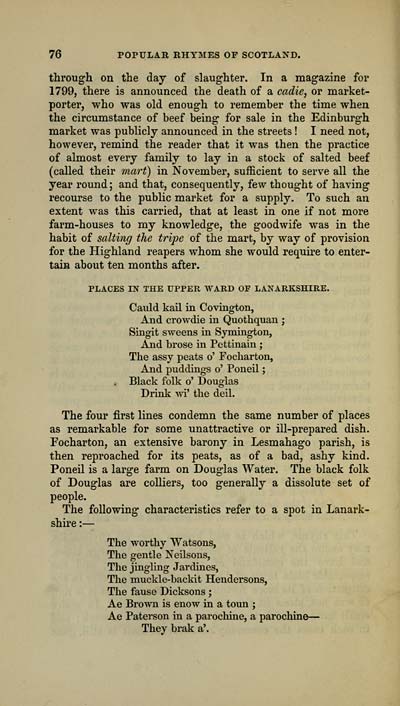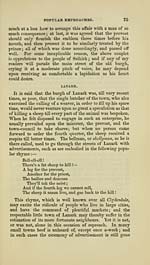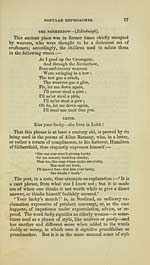Download files
Complete book:
Individual page:
Thumbnail gallery: Grid view | List view

76 POPULAR RHYMES OF SCOTLAND.
through on the day of slaughter. In a magazine for
1799, there is announced the death of a cadie, or market-
porter, who was old enough to remember the time when
the circumstance of beef being for sale in the Edinburgh
market was publicly announced in the streets ! I need not,
however, remind the reader that it was then the practice
of almost every family to lay in a stock of salted beef
(called their mart) in November, sufficient to serve all the
year round; and that, consequently, few thought of having
recourse to the public market for a supply. To such an
extent was this carried, that at least in one if not more
farm-houses to my knowledge, the goodwife was in the
habit of salting the tripe of the mart, by way of provision
for the Highland reapers whom she would require to enter-
tain about ten months after.
PLACES IN THE UPPER WARD OF LANARKSHIRE.
Caidd kail in Co%diigton,
And crowdie in Quothquan ;
Singit sweens in Symington,
And brose in Pettinain ;
The assy peats o' Focharton,
And puddings o' Poneil ;
. Black folk o' Douglas
Drink wi' the deil.
The four first lines condemn the same number of places
as remarkable for some unattractive or ill-prepared dish.
Focharton, an extensive barony in Lesmahago parish, is
then reproached for its peats, as of a bad, ashy kind.
Poneil is a large farm on Douglas Water. The black folk
of Douglas are colliers, too generally a dissolute set of
people.
The following characteristics refer to a spot in Lanark-
shire : —
The worthy Watsons,
The gentle Neilsous,
The jingling Jardines,
The muckle-backit Hendersons,
The fause Dicksons ;
Ae Brown is enow in a toun ;
Ae Paterson in a parochine, a parochine —
They brak a'.
through on the day of slaughter. In a magazine for
1799, there is announced the death of a cadie, or market-
porter, who was old enough to remember the time when
the circumstance of beef being for sale in the Edinburgh
market was publicly announced in the streets ! I need not,
however, remind the reader that it was then the practice
of almost every family to lay in a stock of salted beef
(called their mart) in November, sufficient to serve all the
year round; and that, consequently, few thought of having
recourse to the public market for a supply. To such an
extent was this carried, that at least in one if not more
farm-houses to my knowledge, the goodwife was in the
habit of salting the tripe of the mart, by way of provision
for the Highland reapers whom she would require to enter-
tain about ten months after.
PLACES IN THE UPPER WARD OF LANARKSHIRE.
Caidd kail in Co%diigton,
And crowdie in Quothquan ;
Singit sweens in Symington,
And brose in Pettinain ;
The assy peats o' Focharton,
And puddings o' Poneil ;
. Black folk o' Douglas
Drink wi' the deil.
The four first lines condemn the same number of places
as remarkable for some unattractive or ill-prepared dish.
Focharton, an extensive barony in Lesmahago parish, is
then reproached for its peats, as of a bad, ashy kind.
Poneil is a large farm on Douglas Water. The black folk
of Douglas are colliers, too generally a dissolute set of
people.
The following characteristics refer to a spot in Lanark-
shire : —
The worthy Watsons,
The gentle Neilsous,
The jingling Jardines,
The muckle-backit Hendersons,
The fause Dicksons ;
Ae Brown is enow in a toun ;
Ae Paterson in a parochine, a parochine —
They brak a'.
Set display mode to: Large image | Transcription
Images and transcriptions on this page, including medium image downloads, may be used under the Creative Commons Attribution 4.0 International Licence unless otherwise stated. ![]()
| Early Gaelic Book Collections > J. F. Campbell Collection > Popular rhymes of Scotland > (84) |
|---|
| Permanent URL | https://digital.nls.uk/81375602 |
|---|
| Description | Volumes from a collection of 610 books rich in Highland folklore, Ossianic literature and other Celtic subjects. Many of the books annotated by John Francis Campbell of Islay, who assembled the collection. |
|---|
| Description | Selected items from five 'Special and Named Printed Collections'. Includes books in Gaelic and other Celtic languages, works about the Gaels, their languages, literature, culture and history. |
|---|

